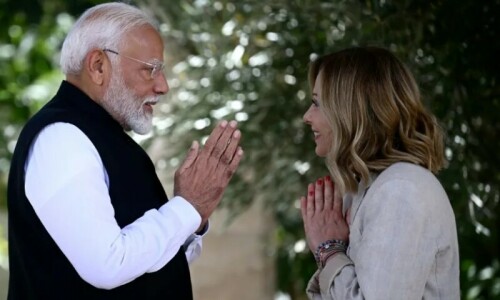ISLAMABAD, March 17: Pakistan on Friday cautioned that grant of waiver by the US Congress to the agreement with India on civilian nuclear cooperation would have serious implications for the security environment in South Asia and said it would not accept any discriminatory treatment.
The Bush administration has sought a waiver from the US Congress for the implementation of the US-India agreement.
“The grant of the waiver as a special case will have serious implications for the security environment in South Asia as well as for international non-proliferation efforts,” the Foreign Office spokesperson said in a statement here.
The spokesperson said the proposed exception for India would not be helpful to the shared objectives of stability in South Asia.
“The agreement, which keeps a large number of facilities and reactors, including breeder reactors, outside safeguards, would only encourage India to continue its weapons programme without any constraint or inhibition.
“On its part Pakistan would not accept any discriminatory treatment,” the statement said.
The objective of strategic stability in South Asia and the global non-proliferation regime would have been better served if the US had considered a package approach for Pakistan and India with a view to preventing a nuclear arms race and promoting restraints while ensuring that the legitimate needs of both countries for civilian nuclear power generation were met, the spokesperson said.
She pointed out that the history of the nuclear development in South Asia showed that Pakistan had pursued the nuclear option only after India tested a nuclear device in 1974.
Pakistan needed to restore the disturbed balance and was compelled to respond when India again carried out nuclear tests in 1998, she said.
By establishing nuclear deterrence Pakistan has ensured peace and stability in South Asia as was proven by subsequent events, especially in 2002.
“Following the resumption of the composite dialogue in 2004, it remains Pakistan’s objective to avoid arms race, promote restraints, reduce risk and maintain the nuclear deterrent at the minimum credible level.”
The spokesperson said that while Pakistan would continue to act with responsibility in maintaining minimum credible deterrence and to avoid an arms race, “we will neither be oblivious to our security requirements, nor to the needs of our economic development which demands growth in the energy sector, including civilian nuclear power generation”.
Pakistan’s civilian nuclear power reactors are totally covered by the International Atomic Energy Agency safeguards, including the spent fuel produced by these reactors.
“Our future nuclear power generation reactors will also be under safeguards,” the FO spokesperson said and added that Pakistan expected all the NSG (Nuclear Suppliers Group) member countries to be sensitive to Islamabad’s energy needs and extend cooperation in the civilian nuclear sector.
KASURI: Meanwhile, Foreign Minister Khurshid Mehmood Kasuri said in an interview to Financial Times that the Indo-US agreement would wreck international agreements to stop the spread of nuclear weapons.
The newspaper quoted Mr Kasuri as saying that the US decision to give nuclear technology to India would encourage other nations to follow suit.
“The whole Nuclear Non-Proliferation Treaty (NPT) will unravel. It’s only a matter of time before other countries will act in the same way,” Mr Kasuri told the daily in an interview.
“Nuclear weapons are the currency of power and many countries would like to use it. Once this goes through, the NPT will be finished. It’s not just Iran and North Korea. Brazil, Argentina and Pakistan will think differently,” he said.
Under the pact clinched during President George W. Bush’s visit to India early this month, New Delhi is to receive US nuclear technology, including reactors and nuclear fuel, in return for separating its military and civil facilities and opening civilian plants to international inspection.
“The US should be conscious of the sentiments of this country (Pakistan). Public opinion sees things in black and white. They compare the US to China and feel it has not been a constant friend the way China has,” Mr Kasuri said.
The United States, he emphasised, should not be treating the two countries (Pakistan and India) differently.—Agencies










































Dear visitor, the comments section is undergoing an overhaul and will return soon.